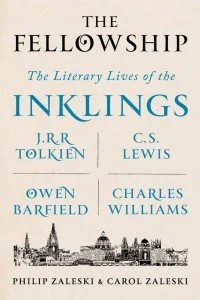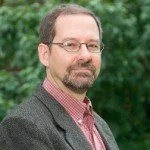The Incredible “Inklings” — Book Review
02-18-2016
By Dr. Robert Cathey
Book Review: The Fellowship: The Literary Lives of the Inklings: J.R.R. Tolkien; C.S. Lewis; Owen Barfield; Charles Williams, by Philip and Carol Zaleski. New York: Farrar, Straus and Giroux, 2015. 645 p. ISBN: 978-0-374-15409-7.
One of my happiest memories of Davidson College was a seminar in my final term (1978) taught by Professors Charles Lloyd (English) and Brown Patterson (History) on the writings of C. S. Lewis. Both Lloyd and Patterson had studied with Lewis at Oxford and Cambridge Universities, and Lloyd credited his conversion to the impact of Lewis as a speaker and writer. In ten weeks we worked our way through many of the apologetic writings and did research on Lewis’ fiction. My mother had read Lewis’ Mere Christianity to our family on a long car trip when I was younger and I reread it in college.
When a McCormick alumnus encouraged me to read The Fellowship last fall, I was transported back to those happy hours hearing firsthand stories of Lewis’ life and the circle of writers around him in Oxford that called themselves ‘The Inklings.’ As the Zaleskis reveal in their massive new multi-biographical study, Lewis’ own conversion was due (in human terms) to multiple factors: his love for mythology and fairy tales from childhood growing up in Ireland; his own academic field of medieval and renaissance English literature; his friendship with J.R.R. Tolkien who was a devout Catholic and other Christian friends; his love of logical argument which contributed to his doubts about an utterly secular outlook on reality; the impact of surviving WWI and the radical transformations of social and cultural life going on in Europe in the twentieth century.
Lewis’ life as a writer of fantasy, science fiction, literary criticism, poetry, and apologetics was nurtured by the gatherings of the Inklings in an Oxford pub and in his own apartment on campus. In this all male circle of scholars and intellectuals (Dorothy Sayers was known to all of them but never invited), deep friendships formed and new writings in draft were shared for trenchant criticism. Lewis learned from the shared scholarship, sharp wit, and literary projects of his peers. Tolkien, ever the perfectionist, first shared drafts of The Hobbit and The Ring Trilogy in this circle. Lewis shared his early apologetic allegory, The Pilgrim’s Regress, his space trilogy, Out of the Silent Planet, Perelandra, and That Hideous Strength, and The Narnia Chronicles.
Today we are much less likely to know the life and works of Owen Barfield and Charles Williams. Barfield, who was deeply influenced by the “Spiritual Science” of Rudolf Steiner, developed a novel theory of changes in human consciousness and language encoded in the history of words. Williams wrote gothic novels of the supernatural and developed a theology of romantic love, lived out in his marriage and Platonic relationships with women he met as an editor for Oxford University Press. The presence of Barfield and Williams in this circle shows that it was hardly a club for Christian conservatives only. On the other hand, all the Inklings had deep grievances against secular modernity and how it robs the spirit, imagination, and language of the very possibilities that make contact with the Sacred possible.
Through their writings, teaching, and role as public intellectuals, the Inklings revolted against modern literature and culture. By creating a new mythology (Tolkien), fairy tales and allegories of the Christian life (Lewis in The Narnia Chronicles), comprehensive theories of consciousness (Barfield), and metaphysical novels about supernatural forces (Williams), these writers reignited the imaginations of children and adolescents of all ages, opening young and old minds alike to envision a world richer and deeper than materialist scientific explanations and existentialist despair. Their various writings presuppose that God touches human lives via imagination and desire, not reason alone. Their works also retrieve the mythology, poetry, fairy tales, philosophy, and cosmology of earlier Christian writers like the author of Beowulf, Aquinas, Dante, John Bunyan (Pilgrim’s Progress), George MacDonald, G. K. Chesterton, et al.
By various rhetorical strategies, the Inklings carved out literary spaces where ordinary human desires and tragedies take on larger meanings in a re-enchanted world indwelt by God, angels, demons, and humans with immortal souls. Given the horrors of two bloody world wars, global economic depression, rise of fascism, the Holocaust, ecologic destruction, and migration of rural peoples and refugees into cities, their contemporaries listened intently when these Oxford Dons addressed them with words of hope and courage.
One of the best chapters, “Mere Christians,” reconstructs the circumstances under which Lewis was invited by producers at the BBC to present a series of radio talks during WWII that we know as the book, Mere Christianity. The Zaleskis recount how when these brief talks came over the airways, conversation halted in pubs all over the United Kingdom as ordinary people listened to Lewis’ arguments about the nature of the moral life and how it leads ineluctably to religious convictions.
My children’s generation grew up with J. K. Rowling’s Harry Potter novels that opened to them supernatural worlds where good and evil struggle to the death. I will never forget reading The Narnia Chronicles to our daughter in first grade, and later reading together Until We Have Faces. Theology without literature can come off as quite thin and brittle. Decades before Harry Potter, the Inklings discovered ways to indwell the world as a re-enchanted place where God calls us through our passion for the beautiful in literature to desire the Creator of all beauty, the Redeemer of all children who have lost their way on the road to adulthood.
Robert Cathey is Professor of Theology at McCormick Theological Seminary, and the author of God in Postliberal Theology (Ashgate, 2009). Currently he is working on a Festschrift for Paulist Press, and the first book for the American Theological Society – Midwest Division.
The Inklings: C.S. Lewis, J.R.R. Tolkien, Owen Barfield, and Charles Williams





